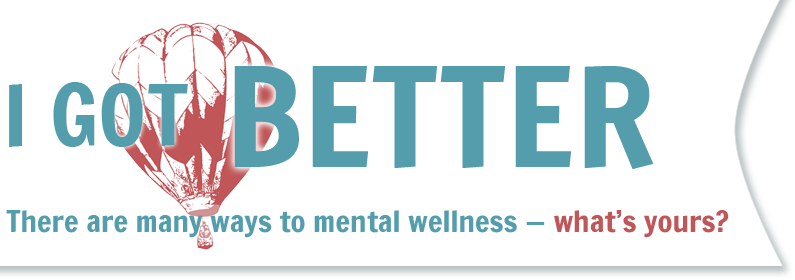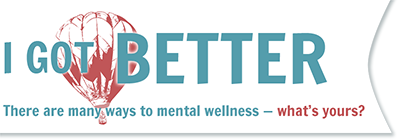Go Your Own Way
By Jennifer

I want to be that person again
I want to be the person I was before I was raped when I was 19 years old and started psychiatric treatment. I was a brilliant, courageous, adventurous child, happy and confident. I want to be that person again.
I have a challenging, exciting job that pays well. It’s stressful as hell, and the responsibility sometimes feels crushing, but I love it. I haven’t been hospitalized for almost two years — a personal record. I’m taking minimal doses of two medications. I’ve successfully refused anti-anxiety drugs, antipsychotics, and mood stabilizers. I am about to get married to the love of my life.
Psychiatric medication can be extremely harmful
I’ve been diagnosed with Bipolar Disorder, Panic Disorder and Depression. Psych meds can give short-term relief to extreme distress. I respond very quickly, within days, to antidepressants, for example. Anti-anxiety drugs did help me to overcome a phobia about driving on the freeway when I lived in Southern California. On occasion, when I’ve had obsessive thoughts of suicide, antipsychotics have calmed me down.
However, overall, I would say that psychiatric medications can be extremely harmful. One example: I took anti-anxiety drugs for over 15 years. By the end of that time, I had serious memory deficits and chronic social anxiety that the drugs simply could not calm. I weaned myself off slowly, against medical advice, and improved dramatically. I’ve gone from taking 13 different psych drugs at a time to taking two; I can’t find a doctor who will help me to eliminate the last two. They just keep repeating the mantra about having to take them my whole life.
Meanwhile I’ve taken antidepressants since the early 1990s, and I honestly believe that they’ve made my depression and suicidal thoughts worse over time. I don’t have severe side effects, but I am chronically nauseated and tend to lose weight. As a result, every new shrink I see interrogates me about my eating habits. Hospital staff; nurses and psychiatrists in particular are often downright threatening and abusive. They spend time trying to cure a problem that I don’t have- anorexia nervosa-, and refuse to deal with the very real physical consequences of the drug’s effects. Doctors have one solution for side effects: more and different drugs.
I’ve been prescribed atypical antipsychotics, not because I have psychotic features, but in the hope that I would gain weight. Over time, psych meds are destructive because doctors refuse to take side effects seriously, and they won’t consider causes of depression other than “heredity” or “biology.” It’s impossible to learn to cope with trauma or negative emotions because doctors don’t have the tools or time to teach you, and therapists are focused on problems I don’t have to the exclusion of my very real concerns.
They also tend to pathologize and treat behavior that I believe is normal for me, that isn’t destructive. Most importantly, I believe that psych drugs have caused my psychiatric condition to deteriorate over time. My weight has been chronically low, which at times was a threat to my health, and has made my hospital stays and interactions with shrinks much more miserable. Before I started refusing mood stabilizers and took myself off of anti-anxiety drugs, I had debilitating short-term memory loss and confusion.
I’ve accomplished a lot
Over the last three years, I’ve made significant changes on my own that have eliminated many of my symptoms. No doctor has ever supported me in reducing medications or finding alternatives. As a result, I felt entirely hopeless about my condition for 20 years. I thought I was condemned to a life in and out of mental hospitals. I’ve had maintenance ECT and taken every drug on the market, and the hope that I have now came from reading books critical of pharmaceutical companies, doctors, and the whole mental health field.
I’ve accomplished a lot. I have a doctorate and a demanding professional job, but I had been in and out of mental hospitals for two decades. No doctor has been willing to look critically at my diagnosis, and consider how much of my symptoms might be iatrogenic. All of the hope that I’ve had has come from sources outside of the industry, and from my own efforts.
I refuse to accept their estimation of me
Where do I begin? I had a mental health tech doing intake write in my chart that I was grandiose because I said I had a doctorate (I have a doctorate from an elite state university). It’s not just that doctors constantly suggest that you lower your professional goals it’s that people refuse to believe that you have the job that you have. No one understands that my happiness requires intellectual effort and professional striving. I thank God that I never considered for a moment dropping out of grad school, taking a sabbatical from teaching, or leaving my current professional job. I simply refused to accept their estimation of me, and their idea that I’m too fragile to work.
I decided I couldn’t possible feel worse
I took myself off of all medication, came very close to making a third suicide attempt, and went into the hospital yet again. The psychiatrist who treated me (I’ve never met him before) gave me absolutely minimal doses of antidepressants, and told me to resist any other doctor’s efforts to increase the dose. He talked to me about St. Augustine, and about his ideas about spiritual crisis as a cause of mental health problems. I’d just finished reading several books critical of psychiatric medications and diagnosis (most importantly Robert Whittaker’s book), and I felt very strongly that medication had caused my psychiatric decline, not arrested it. I was enraged, because I’ve always been a good little patient and complied with any regimen short of mood stabilizers which I hate, and which give me the “stupids”. I decided that I couldn’t possibly feel worse, and that drugs hadn’t worked, and that I would have to figure everything out myself. I also fell in love, and my husband-to-be has supported my decisions and helped me to stop pathologizing behavior that is normal for me.
Do the things that make YOU happy
Don’t obey your doctor or anyone else implicitly. Do your own research find out about any medication before you take it. Understand the mechanism of action. Never accept side effects that destroy your sense of self. You have a right to a working mind and body, and to a functioning sexuality. Thinking and making love are not trivial. Read everything you can about how the psychiatric industry works. Understand the FDA approval process, how drugs are sold, how doctors profit from the prescriptions they write, how diagnoses are created and applied to individuals. Do the things that make you happy. If a drug or doctor prevents you from doing those things, refuse the drug and fire the doctor.


